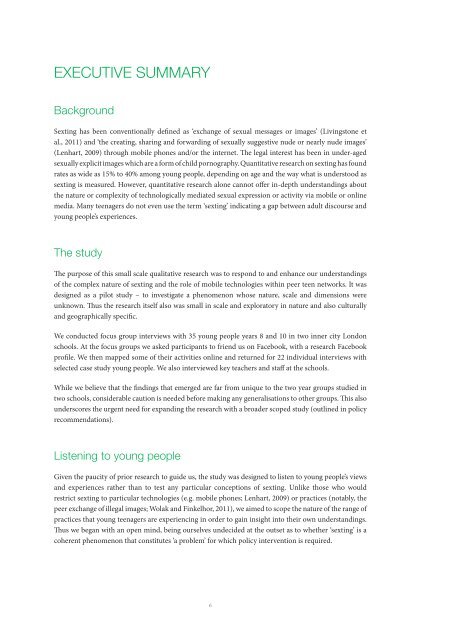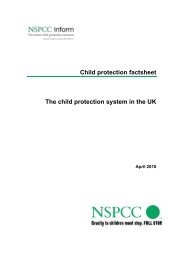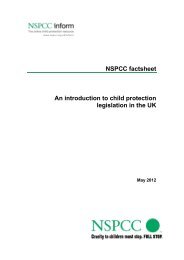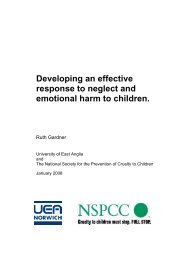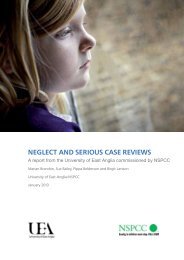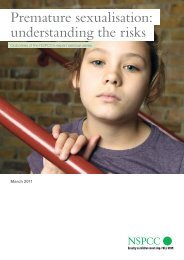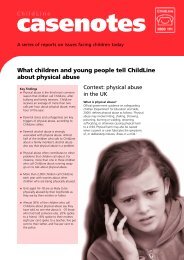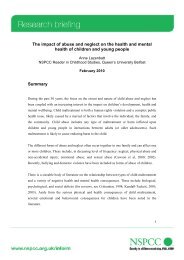A qualitative study of children, young people and 'sexting ... - NSPCC
A qualitative study of children, young people and 'sexting ... - NSPCC
A qualitative study of children, young people and 'sexting ... - NSPCC
Create successful ePaper yourself
Turn your PDF publications into a flip-book with our unique Google optimized e-Paper software.
executive suMMAry<br />
background<br />
Sexting has been conventionally defined as ‘exchange <strong>of</strong> sexual messages or images’ (Livingstone et<br />
al., 2011) <strong>and</strong> ‘the creating, sharing <strong>and</strong> forwarding <strong>of</strong> sexually suggestive nude or nearly nude images’<br />
(Lenhart, 2009) through mobile phones <strong>and</strong>/or the internet. The legal interest has been in under-aged<br />
sexually explicit images which are a form <strong>of</strong> child pornography. Quantitative research on sexting has found<br />
rates as wide as 15% to 40% among <strong>young</strong> <strong>people</strong>, depending on age <strong>and</strong> the way what is understood as<br />
sexting is measured. However, quantitative research alone cannot <strong>of</strong>fer in-depth underst<strong>and</strong>ings about<br />
the nature or complexity <strong>of</strong> technologically mediated sexual expression or activity via mobile or online<br />
media. Many teenagers do not even use the term ‘sexting’ indicating a gap between adult discourse <strong>and</strong><br />
<strong>young</strong> <strong>people</strong>’s experiences.<br />
the <strong>study</strong><br />
The purpose <strong>of</strong> this small scale <strong>qualitative</strong> research was to respond to <strong>and</strong> enhance our underst<strong>and</strong>ings<br />
<strong>of</strong> the complex nature <strong>of</strong> sexting <strong>and</strong> the role <strong>of</strong> mobile technologies within peer teen networks. It was<br />
designed as a pilot <strong>study</strong> – to investigate a phenomenon whose nature, scale <strong>and</strong> dimensions were<br />
unknown. Thus the research itself also was small in scale <strong>and</strong> exploratory in nature <strong>and</strong> also culturally<br />
<strong>and</strong> geographically specific.<br />
We conducted focus group interviews with 35 <strong>young</strong> <strong>people</strong> years 8 <strong>and</strong> 10 in two inner city London<br />
schools. At the focus groups we asked participants to friend us on Facebook, with a research Facebook<br />
pr<strong>of</strong>ile. We then mapped some <strong>of</strong> their activities online <strong>and</strong> returned for 22 individual interviews with<br />
selected case <strong>study</strong> <strong>young</strong> <strong>people</strong>. We also interviewed key teachers <strong>and</strong> staff at the schools.<br />
While we believe that the findings that emerged are far from unique to the two year groups studied in<br />
two schools, considerable caution is needed before making any generalisations to other groups. This also<br />
underscores the urgent need for exp<strong>and</strong>ing the research with a broader scoped <strong>study</strong> (outlined in policy<br />
recommendations).<br />
listening to <strong>young</strong> <strong>people</strong><br />
Given the paucity <strong>of</strong> prior research to guide us, the <strong>study</strong> was designed to listen to <strong>young</strong> <strong>people</strong>’s views<br />
<strong>and</strong> experiences rather than to test any particular conceptions <strong>of</strong> sexting. Unlike those who would<br />
restrict sexting to particular technologies (e.g. mobile phones; Lenhart, 2009) or practices (notably, the<br />
peer exchange <strong>of</strong> illegal images; Wolak <strong>and</strong> Finkelhor, 2011), we aimed to scope the nature <strong>of</strong> the range <strong>of</strong><br />
practices that <strong>young</strong> teenagers are experiencing in order to gain insight into their own underst<strong>and</strong>ings.<br />
Thus we began with an open mind, being ourselves undecided at the outset as to whether ‘sexting’ is a<br />
coherent phenomenon that constitutes ‘a problem’ for which policy intervention is required.<br />
6


